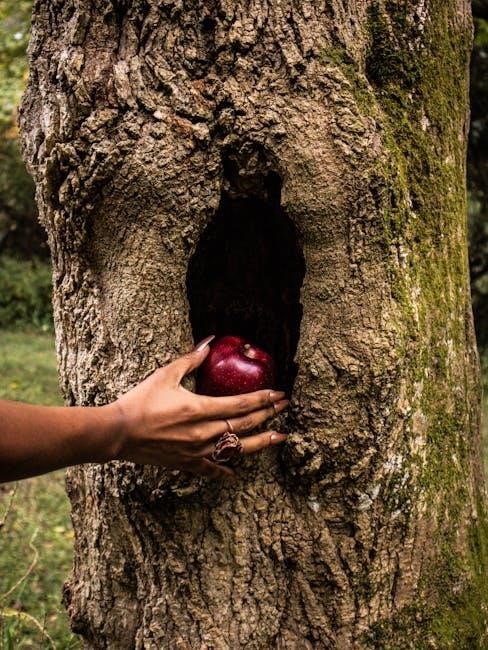
free pdf download on the fruit of the spirit
The Fruit of the Spirit embodies the very essence of Christian living‚ a testament to divine transformation. These virtues‚ born of the Holy Spirit‚ reflect Christ’s character within believers. They are not merely actions‚ but rather deep-seated qualities.
Defining the Fruit of the Spirit
Defining the Fruit of the Spirit goes beyond a simple listing of virtues; it delves into understanding their divine origin and transformative power. The term “fruit” signifies a natural outflow‚ a result of a life lived in harmony with the Holy Spirit. Unlike individual “gifts‚” which are specific abilities granted for service‚ the Fruit of the Spirit represents a holistic development of Christ-like character.
These qualities – love‚ joy‚ peace‚ patience‚ kindness‚ goodness‚ faithfulness‚ gentleness‚ and self-control – are not merely aspirational goals but tangible evidence of the Spirit’s presence within a believer. They are interconnected‚ forming a unified whole‚ each attribute enhancing and supporting the others. Cultivating this fruit requires intentionality‚ a conscious yielding to the Spirit’s guidance‚ and a commitment to living in accordance with God’s will. It is through this process that believers increasingly reflect the character of Jesus Christ‚ becoming living testimonies of God’s grace and transformative power in the world. The fruit shows how a person lives for God.
Biblical Basis: Galatians 5:22-23
The cornerstone of understanding the Fruit of the Spirit lies within Galatians 5:22-23. This passage explicitly contrasts the “works of the flesh” with the fruit produced by the Holy Spirit in the lives of believers. Paul emphasizes that true Christian living is not defined by adherence to legalistic rules‚ but by the inner transformation wrought by the Spirit. The list provided – love‚ joy‚ peace‚ patience‚ kindness‚ goodness‚ faithfulness‚ gentleness‚ and self-control – serves as a comprehensive portrait of Christ-like character.
These virtues are not presented as individual achievements but as a collective “fruit‚” highlighting their interconnectedness and holistic nature. Furthermore‚ Paul notes that “against such things there is no law‚” underscoring that these qualities transcend legalistic constraints and embody the very essence of God’s character. This passage serves as both a foundational declaration and a guiding principle for cultivating a Spirit-led life‚ urging believers to embrace the transformative power of the Holy Spirit and manifest His fruit in their daily interactions and relationships.

The Nine Fruits: Exploring Each Attribute
Delving into the nine facets reveals a profound tapestry of Christ-like qualities. Each attribute‚ from love to self-control‚ reflects God’s nature. Understanding these virtues is crucial for spiritual growth and transformation.
Love
Love‚ the cornerstone of the Fruit of the Spirit‚ embodies selfless devotion and unwavering compassion. It transcends mere affection‚ becoming an active force that seeks the best for others. This divine love‚ agape in Greek‚ is unconditional and sacrificial‚ mirroring Christ’s love for humanity. It is patient‚ kind‚ and forgiving‚ bearing all things‚ believing all things‚ hoping all things‚ enduring all things.
Love is not simply a feeling‚ but a conscious choice to prioritize the well-being of others above oneself. It is demonstrated through acts of service‚ empathy‚ and genuine care. Cultivating love requires a willingness to extend grace‚ offer forgiveness‚ and embrace those who may be difficult to love. It is the foundation upon which all other virtues are built‚ providing the motivation and strength to embody the Fruit of the Spirit fully. Love‚ therefore‚ is both the starting point and the ultimate goal of spiritual growth.
Joy
Joy‚ as a Fruit of the Spirit‚ transcends fleeting happiness; it is a deep-seated‚ abiding gladness rooted in our relationship with God. Unlike happiness‚ which is contingent upon external circumstances‚ joy persists even amidst trials and tribulations. It is a supernatural gift‚ emanating from the Holy Spirit‚ that fills our hearts with contentment and hope‚ regardless of our surroundings.
This joy is not passive; it actively influences our perspective and actions. It empowers us to face challenges with resilience‚ to maintain a positive outlook‚ and to radiate hope to those around us. Cultivating joy involves focusing on God’s presence‚ expressing gratitude for blessings‚ and engaging in activities that uplift our spirits. It is a powerful witness to the transformative power of faith‚ demonstrating that true fulfillment is found not in worldly possessions or achievements‚ but in a life surrendered to God.
Peace
Peace‚ as a Fruit of the Spirit‚ is not simply the absence of conflict but a profound inner tranquility and harmony with God‚ ourselves‚ and others. It is a state of being that surpasses human understanding‚ guarding our hearts and minds in Christ Jesus. This peace is not circumstantial; it remains steadfast even amidst life’s storms‚ providing a sense of calm and security.
Cultivating peace requires surrendering our anxieties and fears to God‚ trusting in His sovereignty and provision. It involves practicing forgiveness‚ resolving conflicts with grace‚ and seeking reconciliation in relationships. Regular prayer‚ meditation on Scripture‚ and spending time in nature can also foster a sense of inner peace. Embracing peace allows us to respond to challenges with wisdom and compassion‚ radiating a calming influence to those around us. It is a testament to the transformative power of the Holy Spirit‚ demonstrating that true peace is found in a life rooted in faith and surrender.
Patience (Longsuffering)
Patience‚ often referred to as longsuffering‚ is a vital Fruit of the Spirit. It is the ability to endure hardship‚ delay‚ or provocation without becoming angry or resentful. More than mere tolerance‚ patience reflects a deep inner strength and a Christ-like attitude towards others.
This attribute enables us to extend grace and understanding‚ even when faced with difficult people or challenging circumstances. It allows us to remain calm and composed when our natural inclination might be to react in frustration or impatience. Cultivating patience involves practicing empathy‚ seeking to understand others’ perspectives‚ and remembering that everyone is on their own journey.
Furthermore‚ trusting in God’s timing and plan is essential for developing patience. We must recognize that His ways are not always our ways‚ and His timing is perfect‚ even when it doesn’t align with our desires. Through prayer‚ self-reflection‚ and relying on the Holy Spirit‚ we can grow in patience‚ becoming more like Christ in our interactions with the world.
Kindness
Kindness‚ a radiant jewel among the Fruits of the Spirit‚ embodies compassion‚ empathy‚ and a genuine desire to uplift others. It transcends mere politeness‚ delving into a realm of selfless acts and heartfelt gestures that reflect God’s love. Kindness motivates us to be considerate‚ offering help‚ encouragement‚ and support to those in need.
This fruit manifests in various forms‚ from lending a listening ear to performing acts of service. It involves treating everyone with respect and dignity‚ regardless of their background or circumstances. Cultivating kindness requires intentionality‚ a conscious effort to see the world through the lens of empathy and respond with compassion.
It calls us to be generous with our time‚ resources‚ and words‚ offering a helping hand to those who are struggling. By embracing kindness‚ we create a ripple effect of positivity‚ spreading light and hope to those around us‚ mirroring the unconditional love of Christ.
Goodness
Goodness‚ a core component of the Fruit of the Spirit‚ signifies moral excellence‚ uprightness‚ and a commitment to what is right. It goes beyond simply avoiding evil; it actively seeks to do good‚ embodying a proactive approach to righteousness. Goodness is not merely the absence of bad‚ but the active presence of virtue in our lives.
This fruit manifests in integrity‚ honesty‚ and a dedication to ethical behavior. It involves making choices that align with God’s principles‚ even when it’s difficult or unpopular. Cultivating goodness requires a constant pursuit of holiness‚ a desire to reflect God’s character in our thoughts‚ words‚ and actions.
It calls us to be a positive influence in the world‚ standing up for justice‚ showing compassion‚ and promoting what is true and honorable; By embracing goodness‚ we become beacons of light‚ inspiring others to pursue a life of integrity and moral excellence‚ reflecting the divine nature of Christ.
Faithfulness
Faithfulness‚ a vital aspect of the Fruit of the Spirit‚ embodies unwavering loyalty‚ steadfastness‚ and reliability. It signifies a consistent commitment to God‚ to others‚ and to our promises‚ regardless of circumstances. Faithfulness is more than just keeping our word; it’s a deep-seated dedication that permeates every area of our lives.
This fruit manifests in our unwavering trust in God’s promises‚ even when we face trials and uncertainties. It involves remaining true to our commitments‚ both big and small‚ and demonstrating integrity in all our dealings. Cultivating faithfulness requires perseverance‚ discipline‚ and a reliance on God’s grace to overcome our natural tendencies toward inconsistency.
It calls us to be dependable friends‚ trustworthy partners‚ and faithful stewards of the gifts and resources God has entrusted to us. By embracing faithfulness‚ we become pillars of strength‚ building relationships on trust and demonstrating the steadfast love of Christ to the world.
Gentleness (Meekness)
Gentleness‚ often referred to as meekness‚ is a powerful attribute of the Fruit of the Spirit‚ characterized by a humble and considerate demeanor. It’s not weakness‚ but rather strength under control‚ a gentle spirit that tempers power with compassion. Gentleness is a virtue that manifests in our interactions with others‚ marked by patience‚ kindness‚ and a willingness to yield.
This fruit calls us to approach others with humility‚ recognizing their inherent worth and treating them with respect‚ even in disagreement. It involves restraining our impulses toward anger and impatience‚ responding instead with understanding and empathy. Cultivating gentleness requires a conscious effort to control our pride and to prioritize the needs of others above our own.
It allows us to create an atmosphere of peace and understanding‚ fostering reconciliation and building bridges in relationships. By embracing gentleness‚ we become instruments of healing and grace‚ reflecting the compassionate heart of Christ to a world in need of tenderness.
Self-Control (Temperance)
Self-control‚ also known as temperance‚ is a vital aspect of the Fruit of the Spirit. It signifies the ability to regulate one’s desires and impulses‚ exhibiting discipline in thoughts‚ words‚ and actions. Self-control empowers believers to resist temptation and to make choices aligned with God’s will‚ even when faced with challenging circumstances.
This fruit calls for moderation in all aspects of life‚ avoiding excess and maintaining balance. It involves mastering one’s passions and appetites‚ preventing them from controlling one’s behavior. Cultivating self-control demands a conscious commitment to resisting instant gratification and to prioritizing long-term spiritual growth over fleeting pleasures.
It brings freedom from the bondage of harmful habits and addictions‚ fostering clarity of mind and spiritual vitality. By exercising self-control‚ believers demonstrate maturity and responsibility‚ reflecting the disciplined nature of Christ and living a life that is pleasing to God. It promotes a life of purpose and intentionality.

Cultivating the Fruit of the Spirit
Cultivating the Fruit of the Spirit requires intentional effort and dependence on the Holy Spirit. It involves actively pursuing spiritual growth through prayer‚ Bible study‚ and fellowship‚ allowing God to transform our character from the inside out.
Living in Harmony with the Spirit
Living in harmony with the Spirit is essential for cultivating the Fruit of the Spirit. This involves consciously choosing to align our thoughts‚ actions‚ and desires with God’s will‚ as revealed through Scripture and the guidance of the Holy Spirit. It means surrendering our own selfish ambitions and embracing a life of obedience and humility.
To live in harmony‚ we must first acknowledge our dependence on the Spirit. We cannot produce these virtues on our own strength. It requires consistent prayer‚ seeking God’s wisdom and guidance in every aspect of our lives. Spending time in God’s Word is also crucial‚ as it provides us with a foundation for understanding His character and His will for us.
Furthermore‚ fellowship with other believers is essential. Encouragement‚ accountability‚ and support from fellow Christians can help us stay on track and grow in our faith. We must also be willing to confess our sins and seek forgiveness when we fall short‚ allowing the Spirit to cleanse and restore us.
Ultimately‚ living in harmony with the Spirit is a lifelong journey of transformation‚ as we progressively become more like Christ in our thoughts‚ words‚ and actions.

Fruit of the Spirit vs. Gifts of the Spirit
The Fruit of the Spirit and the Gifts of the Spirit‚ though both emanating from the Holy Spirit‚ represent distinct aspects of spiritual growth and empowerment. The Fruit of the Spirit‚ as described in Galatians 5:22-23‚ embodies the character of Christ‚ representing the virtues that should be evident in every believer’s life.
In contrast‚ the Gifts of the Spirit‚ detailed in passages like 1 Corinthians 12‚ are specific abilities or empowerments given to believers for the purpose of ministry and building up the church. While the Fruit of the Spirit reflects our inner transformation‚ the Gifts of the Spirit manifest as outward expressions of divine power.
The Fruit of the Spirit is essential for all Christians‚ as it demonstrates our genuine relationship with Christ. The Gifts of the Spirit‚ however‚ are distributed according to God’s sovereign will‚ with different believers receiving different gifts. Both are vital for a healthy and thriving Christian community.
It’s crucial to remember that the Gifts of the Spirit should always be exercised in love‚ as exemplified by the Fruit of the Spirit. Without love‚ even the most remarkable gifts are rendered meaningless.

The Fruit of the Spirit in Jesus Christ
Jesus Christ perfectly embodies the Fruit of the Spirit‚ serving as the ultimate example for believers. Every attribute listed in Galatians 5:22-23 – love‚ joy‚ peace‚ patience‚ kindness‚ goodness‚ faithfulness‚ gentleness‚ and self-control – finds its fullest expression in His life and ministry.
His boundless love compelled Him to sacrifice Himself for humanity. His joy remained steadfast even amidst suffering. He offered peace to those troubled in heart. He demonstrated incredible patience in dealing with His disciples and opponents. His kindness extended to the marginalized and outcast.
His goodness shone through His selfless acts of service. He was unwavering in His faithfulness to His Father’s will. He displayed gentleness in His interactions with others. He exercised perfect self-control‚ even in the face of immense temptation.
By studying the life of Jesus‚ we gain a deeper understanding of what it means to cultivate the Fruit of the Spirit in our own lives. He is the living embodiment of these virtues‚ and through Him‚ we can grow in Christ-like character.